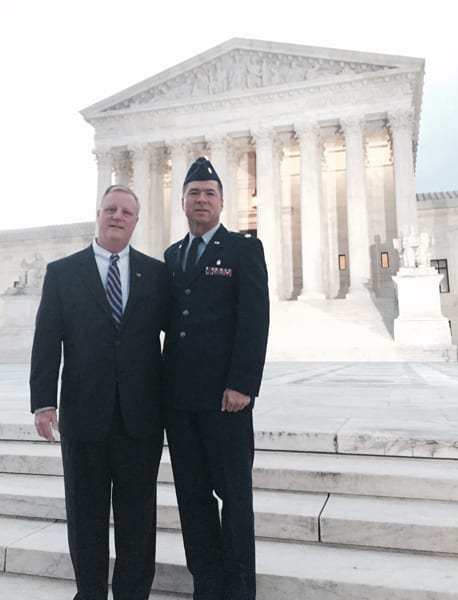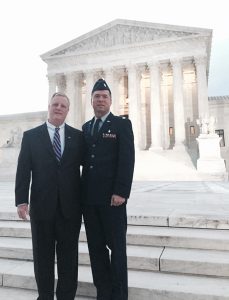Texas marriage equality plaintiffs witness Supreme Court hearing

Mark Phariss and Vic Holmes, the Texas marriage equality case plaintiffs from Plano, attended the Supreme Court hearing today (Tuesday, April 28). Holmes was dressed in his Air Force uniform.
According to Phariss, he barely got into the courtroom. Lined up since the weekend, they were No. 49 and 50 to get in. This morning, someone from a group called Faith in Action cut in the line and so Phariss wasn’t allowed into the building at first. Others, who had been in line with them, shamed the Faith in Action line-cutter into giving up her seat.
“Does your religion teach you to steal?” others asked her.
At the end of the first round of arguments in favor of marriage equality, a protestor who had been in the courtroom began shouting. Phariss said it took four people to escort him out of the court and he could still be heard when he was down the hall.
One of the arguments was that the gay and lesbian community is subject to animus. He said the protester seemed to make that case for the attorneys arguing for equality.
After watching the arguments, Phariss said he expects a 5-4 decision in favor of equality. While the court said it would decide two issues — whether states must recognize marriages performed elsewhere and whether states must offer same-sex marriage — he called the recognition issue a sideshow.
“I don’t think that mattered or will be relevant to what will happen,” he said.
During arguments, Justice Antonin Scalia tried to push the idea that if marriage is made a constitutional right, clergy will be forced to marry same-sex couples. Justice Kagan, who is Jewish, had the clearest rebuttal, saying most rabbis don’t perform interfaith marriages and have never been forced to. No clergy will be forced to marry anyone, she said.
Justice Ginsburg offered one of the clearest arguments against the anti-equality arguments.
“We’re not taking anything away from heterosexuals,” she said in response to the idea that so-called traditional marriage loses something if any two people can marry.












